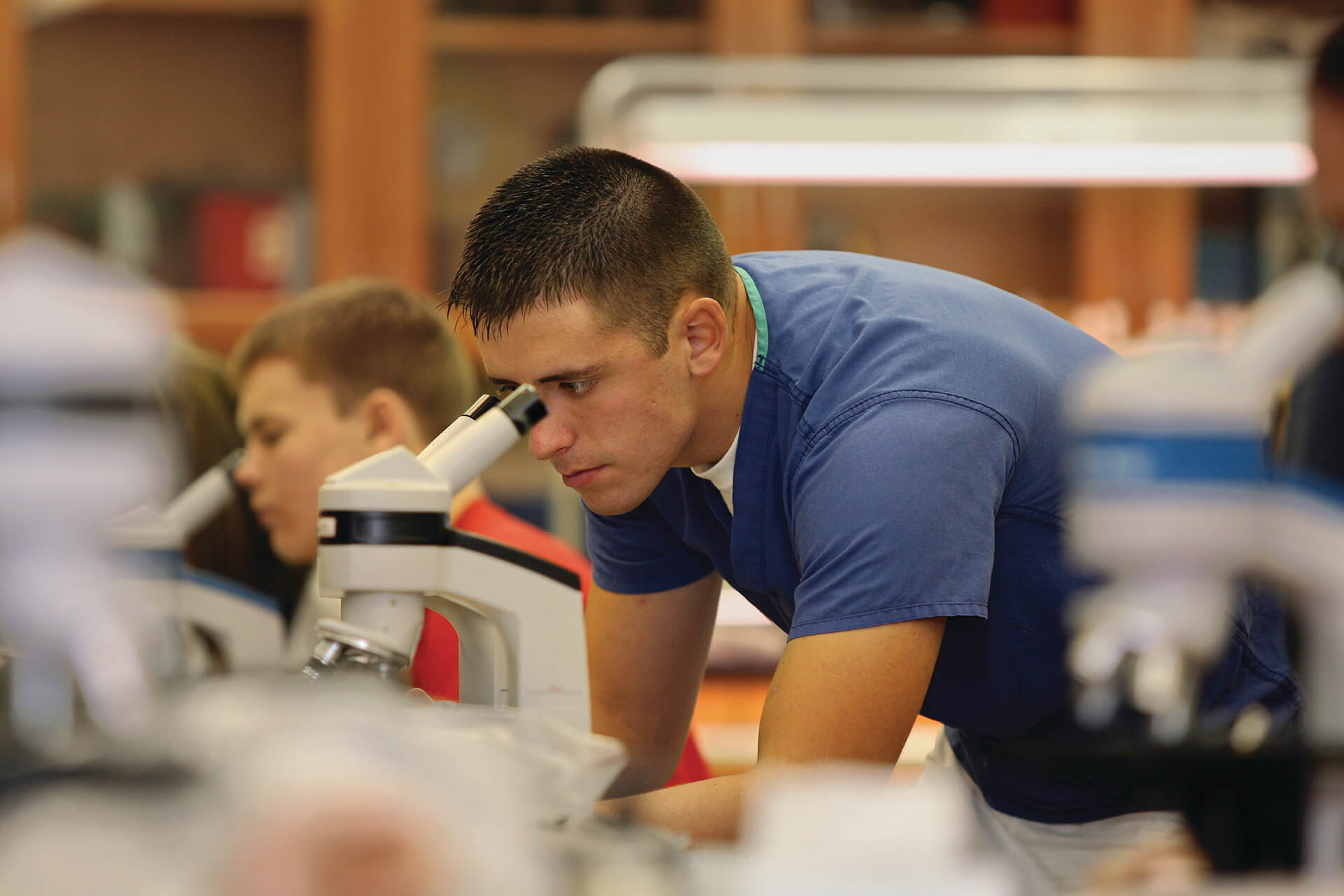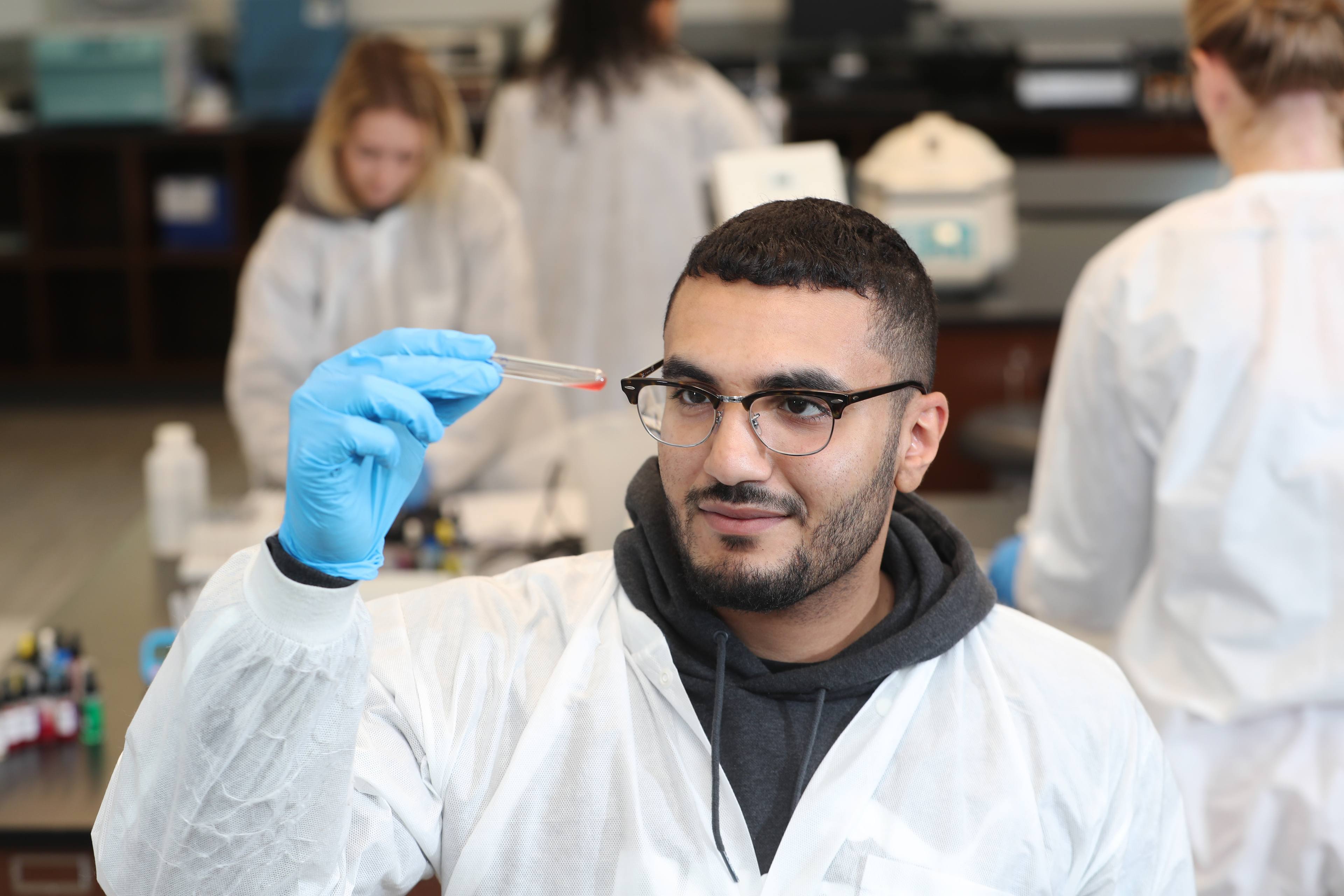Nationally recognized for student experience
The Wall Street Journal

Bachelor of Science (B.S.)
Medical Laboratory Science
The BGSU Bachelor of Science program in medical laboratory science prepares students for a critical role in our healthcare system. Medical laboratory scientists perform hundreds of lab tests that help physicians diagnose and manage disease. They apply scientific knowledge and clinical applications to analyze blood, body fluid and tissue samples.
MLS majors at BGSU complete a required, 18-week internship in a clinical setting. This real-world experience makes all the difference to potential employers. 100% of our graduates seeking employment find jobs within six months.
Students completing the program will be eligible to sit for the MLS certification examination of the American Society for Clinical Pathology.
Because medical laboratory science is an interdisciplinary field, you will take courses in biology, chemistry and allied health.
Are you already working as a medical laboratory technician? The BGSU MLT to MLS program is designed for MLTs with an associate’s degree or equivalent who want to advance their careers. Earn your bachelor’s degree in as few as four semesters in our 100% online degree-completion program.
Why study medical laboratory science at BGSU in Ohio?
- Extensive hands-on experience. A guaranteed 18-week clinical practicum lets you develop your skills in the real world and connect with professionals in the field.
- State-of-the-art laboratories. Practice with the latest instrumentation and technology in our on-campus labs.
- Expert, practicing faculty. Learn from faculty members who work in the field and incorporate their experiences into classroom discussions.
100% of BGSU medical laboratory science graduates report they're employed or in graduate school within six months of graduation.
#1 public university in Ohio for career prep
The Wall Street Journal
Career - what can you do with a medical labratory science degree?
There is a huge demand for medical laboratory scientists. All of our students who are looking for employment find a job within six months of graduation.
Most medical laboratory scientists work in laboratories. They may work in:
- Hospitals
- Clinics
- Physicians’ offices
- Research centers
- Industrial and commercial settings
Medical laboratory scientists also work in the areas of biotechnology, toxicology and various specialties such as cytogenetics and transplantation. They may pursue careers in:
- Laboratory supervision
- Management
- Education
- Customer training or sales (instrumentation, pharmaceuticals and new technology)
The MLS major can also prepare you for graduate or professional school.
Career paths
- Hospital and private laboratories
- Medical and pharmaceutical research
- Public health
- Specialized laboratory departments
- Sales and marketing
- Infection control
- Education
Quick Facts from the Bureau of Labor Statistics
Curriculum
Medical laboratory science students are encouraged to acquire a liberal arts education during the first two years of the program while completing prerequisite science courses.
You are required to apply to the professional portion of the program, typically upon completion of your sophomore year in the spring.
The junior and senior years are devoted to completion of:
- Core required courses
- Professional study and training through lectures, laboratory instruction, seminars and supervised clinical practice at an affiliated hospital laboratory
Students who enter the program as a freshman should complete the degree in four years. Students who transfer from another university or major may require more time to complete the pre-professional portion of the program.
Those who successfully complete the program receive a Bachelor of Science in medical laboratory science (formerly medical technology) and certificate of clinical training. You are then eligible to take either of the national certification examinations for medical laboratory scientists.

Sample courses
- Diagnostic Microbiology
- Hematology
- Clinical Immunology
- Transfusion Medicine
- Clinical Chemistry
#1 university in Ohio – big or small, public or private – students would choose again
The Wall Street Journal
Internships
You will complete an 18-week clinical practicum at one of our many affiliated medical centers in the area during your junior and senior years. This hands-on learning opportunity provides:
- Experience in research and clinical practice
- A chance to apply your knowledge to real-world problems and situations
- Invaluable networking opportunities with practitioners in the field
Admission to professional portion of the program
You are required to apply to the professional program, typically at the end of your sophomore year in the spring.
- MLS program application for currently enrolled BGSU students
- MLS program application for non-BGSU transfer students
Transfer students who have completed their required core science courses and BG Perspective requirements (general education prerequisites) can meet with an academic advisor or the MLS program director to determine eligibility for application.
Admission requirements
- GPA of 2.5 of higher
- Completion of required courses with a grade of “C” or better
You must maintain a 2.5 GPA throughout the professional program. Any courses resulting in a grade lower than “C” must be repeated.
News
The medical laboratory science program is part of the Department of Public and Allied Health in the BGSU College of Health and Human Services.
Accreditation
The medical laboratory science program is fully accredited by the National Accrediting Agency for Clinical Laboratory Sciences (NAACLS) and is in good standing. NAACLS: 5600 N. River Rd., Suite 720, Rosemont, IL 60018-5119; 773-714-8880.
Bowling Green State University [BGSU] is accredited by the Higher Learning Commission. BGSU has been accredited by the Higher Learning Commission since 01/01/1916. The most recent reaffirmation of accreditation was received in 2022-2023, with our next reaffirmation of accreditation scheduled for 2032-2033. Questions should be directed to the Office of Institutional Effectiveness.
Request Information

Updated: 09/25/2025 11:50AM



